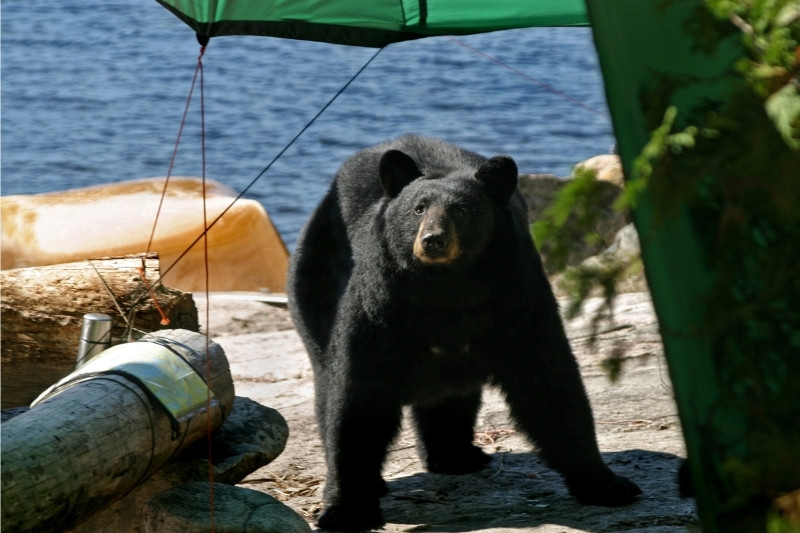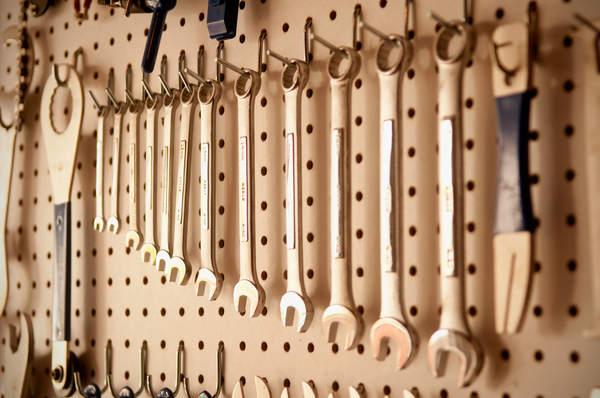You want to plan a trip to the backcountry, but what about bears in the wilderness surrounding the campsites? The best thing to do is to keep bears away from you, to begin with, so what naturally attracts them to your camp?
Unfamiliar scents attract bears, but that isn’t limited to human food. They’ll also come for pet food, bottled and canned items, coolers, toiletries, cooking oils and fuel, and clothing that smells like cooking. Be sure to clean up thoroughly, including spills, grills, and the fire pit.
If you want to learn what brings bears to your campsite, this detailed breakdown will guide you to a safer camping experience.
What Brings Bears While Camping?
Take some precautions to ensure that you and your camping party are prepared to ward off bears looking for a good snack.
Avoid these items around your campsite, and you won’t give a bear any reason to come visit you while you slumber.
1. Scent of Cooking
Try to minimize the scent of cooking in the air to eliminate the chances of an unwelcome visit.
Whether roasting some s’mores or heating, a can of beans doesn’t matter. Bears are naturally drawn to the smell of food over a campfire.
Of course, it’s impossible to spend a weekend in the great outdoors without cooking.
If you have the space, try to position your tent 100 yards away from the campfire and food prep areas at the campsite.
This ensures that bears will be a good distance away from you if the inevitable scent of cooking rouses their curiosity.
2. Clothing Smells
Keep in mind that your clothes may also smell like your last meal. Try to change out of them and leave dirty clothes close to the food prep station.
This makes it less likely that bears will interfere with your sleeping arrangements.
To keep bears at bay, hand wash your clothes with unscented, biodegradable soaps designed for camping.
Dr. Bronner’s Pure Castile Soap is a great option because it can be used for just about everything: bathing, clothes, and dishes.
3. Open Food Containers
Bears are known for their keen sense of smell. You might be surprised even if you think your food doesn’t have a smell that’ll attract bears.
They’re naturally drawn to food and trash, so be sure to put it up when you can. Keep it in a trash can with a tightly-sealed lid or bear-proof container.
You should also remember that any type of food can attract a bear. However, avoid bringing foods with extremely strong smells, such as bacon.
While you want to keep your kitchen about 100 yards from the tent, food storage should be about 200 feet away from the tent and cooking area.
If you have many items that smell strongly, place them on a tarp or in a bag with a drawstring.
Using a rope, pulley it up high in a tree far away from your campsite. This keeps your food up high, so roaming bears have to climb to reach their snack.
This creates noise and alerts you to a bear in camp. Have mud near the tree’s base, or add water to make your own.
This allows you to view paw prints to determine how large the bear was the next morning.
4. Bottled and Canned Goods
Bears can smell right through the packaging even if your food is still in the can or bottle.
Never store foods in your tent because bears might come looking for what they can clearly smell.
They’ll even come closer for a chance to snag some of your pet food. This also applies to cooking oils and fuels – an enticing scent that most bears can’t resist.
Store food in a bear-resistant storage box. The campground sometimes provides these to help minimize the threat of bears wandering into campsites.
5. Spills
There’s one thing you simply won’t be able to avoid that can still attract bears.
Spilling food on the ground leaves a lingering odor, even if you clean it up quickly. It’ll stay in the scent of the dirt or foliage.
Because bears have such incredibly powerful noses, they’ll pick up on the aroma quickly. Do your best to apply lots of water to the spill to dilute it.
However, the best thing to do is to be extremely cautious while cooking or preparing food.
It’s far better to avoid a spill in the first place than to do damage control later in the day.
Don’t bring foods that have strong smells and require grease cleanup, making spills even more difficult to clean.
6. Leftover Pet Food
Dogs are notoriously messy eaters, leaving pieces of kibble around their bowls.
If your dog is like this, you might want to consider feeding Fido away from the campsite. Bears will smell those errant pieces of kibble and come searching for more.
Once they arrive, bears are likely to find where you stored the rest of your pet food and may do some digging for other tasty treats.
It’s a worthwhile investment to get bear-resistant containers for your pet food if you take your four-legged friends camping with you often.
7. Pets
Bears love a good meal and don’t mind tracking down something fun to hunt.
While pet food might be enticing, your pet itself is another great reason for bears to visit your campsite.
They may hear your dog rustling around in the leaves at night, sounding like many of their prey animals.
Dogs might try to mark the area as soon as you arrive, but this can also signal a hungry bear to come to check things out.
They can smell undigested food and urine. Try to keep your dog from going to the bathroom near your campsite.
If he does, always pick it up and discard it properly.
The other disadvantage to bringing your dog along with you to the campsite is that they tend to bark when big animals like bears approach.
This may scare a bear off, but it could also provoke them. If they think they can take on your dog (and they probably can), they just might try it.

8. Toiletries
You wouldn’t dream of popping the top off your shampoo and taking a big swig, but a bear might. Toiletries that smell are fair game for bears.
This can include soaps, toothpaste, deodorants, and lotions. Sunscreen can also smell particularly appealing to a bear, as can insect repellant.
While you won’t be able to avoid packing toiletries, try to look for unscented varieties.
If that isn’t possible, keep them in a sealed container to minimize the smell as much as possible.
9. Trash
Bears are foragers who will come to investigate anything out of the norm at your campsite. They’ve learned that trash often contains something delicious.
If you arrive at your campsite and find trash strewn everywhere from the last visitor, it’s a good idea to pick it up immediately.
This also means you need to have a system for your trash. Bring a can, make frequent treks to communal dumpsters, or get a bear-proof container.
Removing all of your trash before you leave the campsite anyway is good manners.
10. Dishes
You won’t have a dishwasher when you’re spending the weekend in the great outdoors.
While you can get dishes and eating utensils as clean as possible with a hose or in the river, they won’t be as clean as you might think.
Often, they’ll harbor the scent of your most recent meal. This lingering odor is one way to attract bears to your campsite.
The same draw of leftover foods and beverages left out at the campsite. Bears can smell this from a long way off.
11. Coolers
While there’s no way to avoid bringing food to your campsite altogether, it should be noted that bears can even smell the contents inside of your cooler.
Keep it closed to minimize the chances that a bear will smell it from far off.
However, if they come to your campsite, they’re likely to be attracted to your cooler and may destroy it trying to get inside.
12. Cleaning Supplies
Most campers would argue that their cleaning supplies don’t smell the least bit appealing as a meal. However, they don’t understand how a bear thinks.
Cleaning supplies, particularly those with a scent, signal something new and different in the environment.
Bears are naturally curious and might come closer to see what’s happening when they smell something unfamiliar.
Once they’re close to your campsite, they’re likely to start foraging for other items that might be more appealing than cleaning sprays or dish soaps.
13. Dishwater
It isn’t just the cleaning supplies that can attract a bear to your campsite. Dishwater is another common culprit that will have bears coming in for a closer look.
When you wash your dishes, you’re rinsing away food particles.
If you do this in the middle of your campsite, you’re allowing the food particles to flow to the dirt where you’ll spend the most time.
Bears are sure to smell this discarded food and want to see what else they can find. Always wash dishes far away from the campsite or strain your dishwater.
Any food items that get strained out of the dishwater should be properly discarded in a bear-resistant container.

14. Bathroom Areas
Bears are drawn to campsites with their noses, so it makes sense they’ll come looking if they smell your bathroom location.
These smells don’t mark your territory, as many campers mistakenly believe. Instead, they serve as an open invitation for bears to come and say hello.
When you need to urinate, step outside your campsite and ensure you’re upwind.
This helps prevent bears from entering your camping area to explore this new scent. If you need to defecate, bury it in a hole 6 to 8 inches deep.
Both should take place about 100 feet from your campsite and away from water sources.
15. Grills
It’s nearly impossible to avoid having your food drip while cooking it over the grill.
Whether you use a camping stove or a charcoal grill, you’ll likely have some lingering scent.
Try to scrub away food in an area near the campsite, but you won’t be able to permanently get rid of the smell of delicious cooked meals.
If you know that you’ll want to use a grill, try to position it so that the grill is on the outskirts of your campsite.
This means that if bears come sniffing around for some grub, they’ll be well away from your tent, where you’re blissfully sleeping.
Clean up spills even if you’re cooking directly over a fire pit.
You might not think a bear is interested in that burnt marshmallow, but they will gobble up just about anything you leave.
16. Natural Food Sources
Almost anything can smell appealing to a bear. This is why you need to choose your campsite with care.
Anything that could attract one of these wild animals should be kept far away from your tent at night.
That means avoiding natural food sources where bears are used to coming to look for a midnight snack.
What constitutes a natural food source for a bear?
Look for things like berry bushes or animal carcasses. Try to clear any local streams where the fish might be plentiful.
Camping in bear territory can be quite difficult if you choose a campsite away from all the food they would traditionally eat.
Given their omnivorous nature, it may not be possible to avoid all food sources for a bear.
Do your best to position tents away from the food sources, even if you must share the area with a large bear.
17. Familiarity
Bears have a powerful sense of smell but an even more powerful memory.
If they got lucky and got a tasty snack from the last campers, they’re likelier to try the same spot again.
You can’t necessarily help this, but you can be mindful of whether bears have been in the area.
When given a choice, observe a potential campsite for signs that bears have recently been near the area.
This can mean observing the trees for claw markings that indicate giant bears, seeing tracks, or looking for piles of bear scat.
What do you do if you notice any or all of these conditions? You pack up your campsite and head to another area.
This means that bears are not only close by but are likely to visit again soon.
Research Bears in Your Area
When planning a camping trip, researching bears in the area is essential.
Know when mating season is versus hibernation, and what types of bears might be found in the campground.
You might find brown or black bears, grizzlies, or polar bears, depending on where in the US you’re camping.
Black bears are the most common type found in forests and mountains in almost all 50 states (except Hawaii).
They’re likely omnivores, eating grass, plants, and small deer and moose.
Many become accustomed to human food they find while foraging campsites and prefer this type of food to a more traditional diet.
Brown bears or Grizzly bears are also widespread and maintain a similar diet to black bears.
They tend to be lazy hunters and take what is easiest for them instead of hunting larger prey.
You’ll see brown bears in Alaska, Idaho, Montana, Washington, and Wyoming.
Polar bears are found in the Arctic regions of the north, namely in Canada and Alaska.
They’re primarily carnivores, securing up to 90 percent of their diet from hunted prey such as seals, reindeer, and birds.
Otherwise, they’ll feast on berries and what few plants they can find.

Final Thoughts
Camping is great fun, but it comes with a healthy dose of fear when considering attracting bears to your campsite.
Foreign smells mostly attract them, so try to limit the number of scented products you bring.
Do your best to keep your campsite clean and store smelly items in bear-safe containers away from your tent area.
By avoiding these things, you can keep bears away from your campsite and rest more easily at night.







